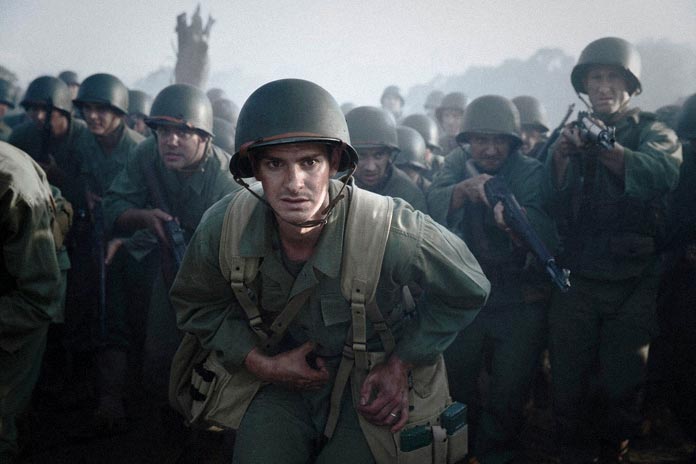
Hackneyed Ridge is more like it.
 It has been ten years since Mel Gibson took a seat behind the camera
as a director for 2006's Apocalypto, but he isn't able to
elevate the weakness in the material through his mastery of scope and
vicious violence. Oh, the violence is there alright, but the
grisliness is so overdone throughout that the overall effectiveness
becomes numbing with each repeated occurrence, until we're left with
little to be shocked or enthralled by as horrific scenes of war
continue to play out over long stretches of Hacksaw Ridge's
second and third acts.
It has been ten years since Mel Gibson took a seat behind the camera
as a director for 2006's Apocalypto, but he isn't able to
elevate the weakness in the material through his mastery of scope and
vicious violence. Oh, the violence is there alright, but the
grisliness is so overdone throughout that the overall effectiveness
becomes numbing with each repeated occurrence, until we're left with
little to be shocked or enthralled by as horrific scenes of war
continue to play out over long stretches of Hacksaw Ridge's
second and third acts.
Gibson's film loosely showcases the true story of small-town Virginia
resident Desmond Doss (Garfield, 99 Homes)
and his
heroic actions as an American soldier fighting in the Pacific against
the Japanese forces during the waning days of World War II.
Doss, a devout Seventh Day Adventist and believer in pacifism,
enlisted into the Armed Forces because he believed in the fight, even
though he wished to help out without the need for killing the enemy on
the other side, trying to go through basic training retaining his
unwavering beliefs to help his fellow man and his country by becoming
an unarmed medic.
The film follows Doss's dysfunctional upbringing in a heavily
religious household with an uncompromising and unstable father
(Weaving, Hobbit: Battle of the Five Armies), who
becomes distraught that his two sons have chosen to enlist in the
Army, followed by his courtship of a local nurse named Dorothy
(Palmer, Lights Out). Doss
develops an interest in helping to save others like Dorothy does,
which curtails to his keen interest in doing the best good to save as
many lives as he can on the battlefield in WWII. Doss enlists,
and is an excellent recruit, but eventually butts heads with his
superiors by refusing to pick up a firearm, which also tests the
levels of trust within his fellow soldiers who feel that Doss will become more of
a liability that might get them all killed.
Very few clichés are left untouched by Hacksaw Ridge,
starting with the sweet but very corny meet-cute romance aspects, to the make-up of the
platoon to which Doss is assigned, which is chock full of Hollywood
movie ethnic stereotypes. Further compounding the distractions from the
harrowing but heroic events of Doss's story is the introduction of
Vince Vaughn (Unfinished Business) as their feisty and foul-mouthed drill sergeant, whose
mere presence is so woefully out of place that the audience with whom
I viewed a screening of Hacksaw Ridge would laugh on a number
of occasions in which he would appear, even when he wasn't doing
anything particularly amusing within the scene (though he does give it
a semi-comedic portrayal).
The lumbering, flavorless script by TV veteran scribes Andrew Knight
(The Water Diviner) and Robert Schenkkan (The
Quiet American) is perhaps the largest liability of Hacksaw
Ridge, further compounded with questionable casting choices of
mostly Australian actors with limited range, such as Luke Bracey (Point
Break) and
the aforementioned Vince Vaughn, who make their line readings feel
very much like running through a script than anything a real person
might say in their situations. Not all of the acting is
standard-to-poor, as Andrew Garfield continues to show why he is one
of the most underrated of young actors around, offering up a handful
of key emotional scenes with conviction, despite being saddled with a
rural accent that has him sounding like a Forrest Gump doing less-hip
impression of Snoop Dogg much of the time.
Much of the feeling among viewers regarding the film may come from the
titillation factor of horror-movie levels of visceral gore within the
battleground sequences. How much credit you give to the movie
will come down to your own taste for the pornography of violence,
especially within Gibson's films, but I will offer the counterpoint to
those who champion the film as something truly good that if the hard-R
levels of gore were removed from the film entirely, one could easily
see all of the many flaws within the storyline that hamper it from
taking hold as one of the netter war films in recent years.
The ending of the film is particularly dubious, as it puts pacifist
Doss in the role of actually being an enabler to even more killing and
bloodshed through his heroics, diluting the main theme of finding ways
to preserve peace from within war, rather than the other way around.
Doss does appear to be as sympathetic to Japanese soldiers and their
severe injuries, though the same cant be said of Gibson's portrayal of
them as frightful and vicious savages by comparison to the more
mirthful and naive American soldiers.
The film ends with clips from nearly 15-year-old interviewees,
including the real-life Doss, who detail that many of the acts within
the movie are based on fact, though it definitely feels like an
over-amplified version of truth within cinema than something we might
see in real life. Unlike, say, Saving Private Ryan,
which ramped up the levels of realism in the brutality of war unlike
anything we had seen from a Hollywood production before, Hacksaw
Ridge seems to revel in its repugnant portrayals of combat, which
will likely turn off crowds looking for something heartfelt from their
war films, and will also likely send the wrong message to those who
aren't.
In short, unless you're looking for a wholly broad-stroke kind of war
film with lots of gushing blood and guts hanging out of cavernous
wounds, there's not a whole lot here to recommend for more discerning
viewers, other than the fact that war films on a grand scale are
almost always inherently watchable due to the high stakes of their
premise. It is effective in spots, but it doesn't quite congeal
enough as a whole to overcome the liabilities in its bombastic but
banal visual presentation. Although attempting to pay service to
a great war hero, this is definitely not the kind of war biopic one
would suspect Medal of Honor-winning Desmond Doss would ever have
authorized to make.
Qwipster's rating:







©2016 Vince Leo

 It has been ten years since Mel Gibson took a seat behind the camera
as a director for 2006's
It has been ten years since Mel Gibson took a seat behind the camera
as a director for 2006's